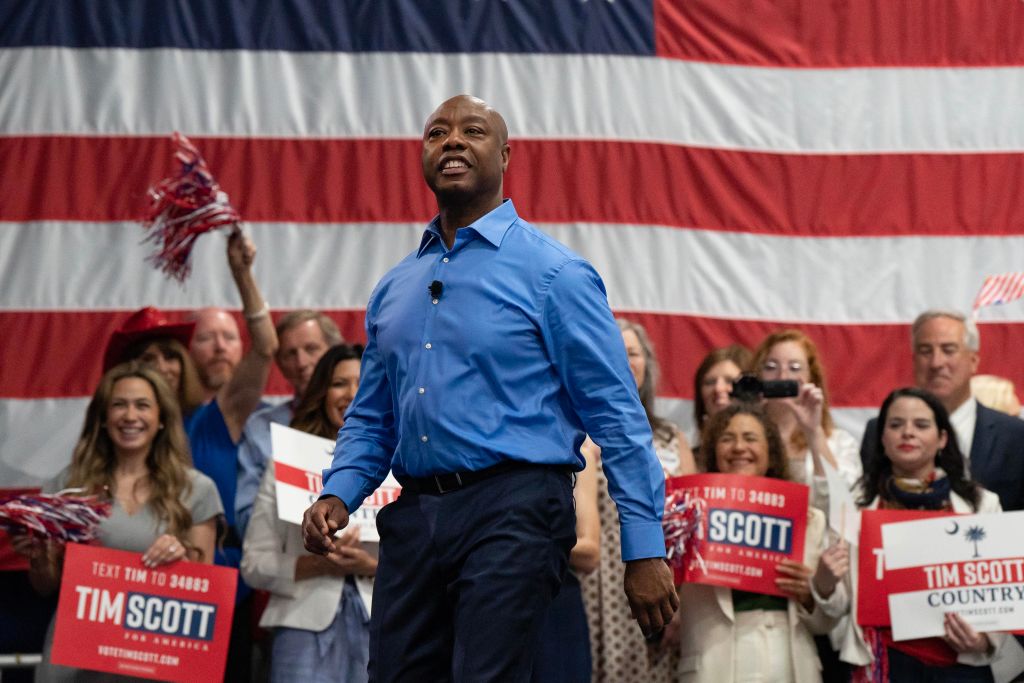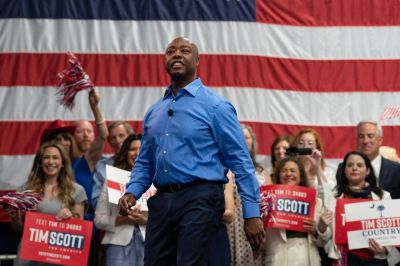NORTH CHARLESTON, South Carolina—Watching Sen. Tim Scott announce Monday that he is running for president was like experiencing a Donald Trump rally in an alternative universe.
In the gym at Charleston Southern University, Scott invited people from the audience onto the stage—not to comically riff at them as Trump loves to do, but to give flower bouquets to family and friends. Instead of a “Lock her up!” call and response, Scott offered simple aspirationalism: “Let’s go! Let’s go!” When he went off-script, it was less angry talk-radio show caller and more Southern Baptist preacher.
“We have an unusual responsibility. We have the responsibility to prove that self-governance works,” he said, stepping down from the stage and onto the floor, pacing and speaking in a hushed tone. “We have the responsibility to share, for a thousand generations, what America’s done for me, she can do for you.” Multiple “Amens” rang out from the crowd.
As attendees filed out of the gym and Scott took selfies, Mick Mulvaney, the former South Carolina congressman who later served as Trump’s budget director and acting chief of staff, reflected on the differences.
“Trump rallies tend toward the negative. They are largely an airing of grievances: This is why things are so bad, this is why people are keeping you down, this is why you should be angry,” said Mulvaney, who is close friends with Scott. “This is the flip side of that. This is entirely positive. You don’t walk out thinking about how mistreated you are, or who is mistreating you. You walk out feeling good about being an American.”
The contrast is no accident, conversations with multiple Scott advisers reveal. His team wants Republican primary voters to see the 57-year-old South Carolina senator as a clean step forward for the party. He won’t try to out-Trump Trump, nor will he try to dilute the former president’s harshest characteristics to sell himself as Trump-lite. But don’t expect Scott to center his campaign around taking down Trump directly—or any of his other rivals, including Florida Gov. Ron DeSantis or his fellow South Carolinian, Nikki Haley.
Scott’s theory of how he wins the Republican nomination rests on two propositions: that enough GOP primary voters are looking for an optimistic conservative message, and that they value candidates who stay above the fray, not down in the mud with Trump or anyone else.
That theory infused Scott’s announcement speech Monday.
“Our party and our nation are standing at a time for choosing,” he said, echoing another optimistic Republican, Ronald Reagan. “Victimhood or victory? Grievance or greatness? I choose freedom and hope and opportunity.”
His remarks were aimed not at Trump or any other Republican, but at President Joe Biden and a liberal view of America that Scott argues his own life and experience—as a black man raised by a single mother—disprove.
“America is not a nation in decline. But under Joe Biden, we have become a nation in retreat,” he said. “So all we need to do is turn around.”
Despite not mentioning Trump’s name, Scott is implicitly rebuking the Trump worldview, concerned as it is with American carnage that can be reversed only with “strength” in a war of attrition. While many of his policy proposals fall along populist Trumpian lines—being tough on crime and illegal immigration, encouraging American manufacturing and energy production, limiting both imports and foreign investment from China—Scott’s tone and personal story are an effort to de-escalate the tension and universalize the appeal of his right-wing politics.
“As president, I will rebuild and restore every rung of the ladder that helped me climb,” he said Monday, “because I want my American story to pale in comparison to yours.”
The question for Republican voters remains: Eight years after accepting Trump’s darker assessment of the country’s problems, do they want a more traditionally conservative message from a non-traditional Republican messenger? Or does the overwhelming support for Trump in the early polls indicate the former president’s grip remains firm?
Scott’s campaign is gambling on the former. And with $22 million cash on hand, a super PAC backed by billionaire Larry Ellison, and home-field advantage in an early primary state, the team is counting on having plenty of opportunities to persuade Republicans not to vote against Trump, but to vote for Scott.
Chris Petry, 50, from Mount Pleasant, said he’s supporting Scott for that very reason. “He has just a vision for the country that talks about unity,” Petry told The Dispatch. “A lot of people that I know who are Republican voters are looking for a change.”






Please note that we at The Dispatch hold ourselves, our work, and our commenters to a higher standard than other places on the internet. We welcome comments that foster genuine debate or discussion—including comments critical of us or our work—but responses that include ad hominem attacks on fellow Dispatch members or are intended to stoke fear and anger may be moderated.
With your membership, you only have the ability to comment on The Morning Dispatch articles. Consider upgrading to join the conversation everywhere.